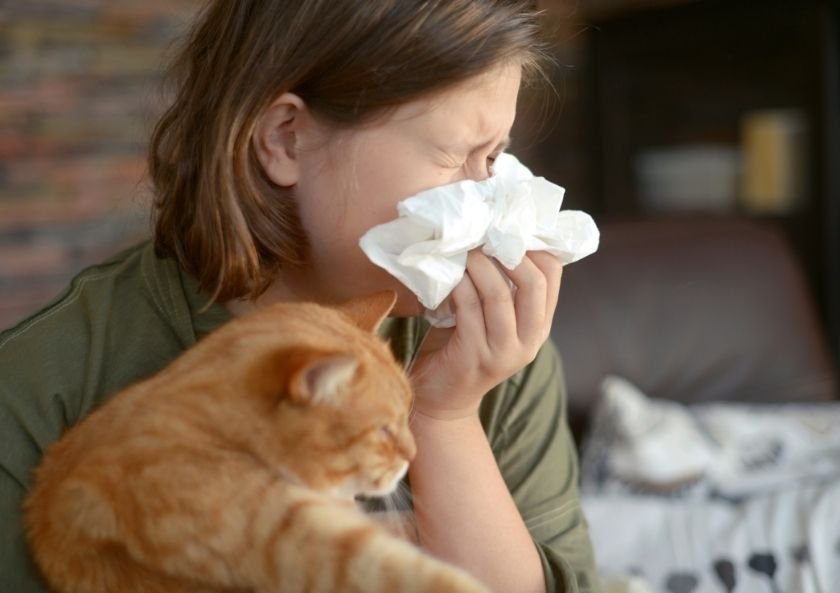Do not forget that although pets are very popular, they can cause allergic complaints. Allergies to pets, especially cats and dogs, are the most common allergies, as well as to other hairy animals such as hamsters, rabbits and birds.
Complaints about allergic to animals can be listed as follows:
Rhinitis, itching, congestion
Sneeze
Itching, lacrimation
Pain in the sinuses and headache
Cough, wheezing, wheezing
Urticaria, angioedema (swelling, itching)
What is the dog cat pet allergies
When we stroke dogs and cats or after a game, if a runny nose starts, itches and sneezes, and if irritation and itching appear in the eyes, and shortness of breath begins and wheezing with sneezing, chances are that you are allergic to your pets. After playing with your cat and dog, an allergy to a cat and a dog seriously affects your work, study and life. Even if there are no cats and dogs in the environment, the symptoms of cat allergies may persist because of the potential effects of cats and dogs on allergies, especially in confined environments.
Allergic complaints created by a cat and a dog can sometimes not belong only to a cat and a dog. Cats and dogs can also cause increased symptoms of house dust and pollen allergies. Because cats and dogs carry home dust and pollen. In these cases, the allergy is directed to dust or pollen at home, rather than directly to cats and dogs.
What Are the Symptoms of Allergies to Pets (cats, dogs)?
Complaints caused by an allergy to cats and dogs, ranging from mild to severe, depending on the sensitivity and the level of exposure to allergens of cats and dogs. These complaints can also affect how quickly symptoms develop after the detection of allergies in humans.
İn a few minutes after entering the house with a dog, he may have signs of shortness of breath, wheezing, swelling of the lips, or rash on the eyelids.
Symptoms of allergies to cat and dog include:
Sneezing or runny nose, flushing and itching
Pain in the sinus areas (from nasal congestion)
Cough, chest tightness, shortness of breath and wheezing
Irritation, redness and itching in the eyes
Skin rashes may include urticaria and angioedema.
Some people may develop a rash or urticaria angioedema when the cat and dog lick or scratches.
How to diagnose allergies to pets (cats and dogs)?
Cats and dogs are very lovable, but if you love cats and dogs, the nose puff leads to complaints such as sneezing, shortness of breath, etc. Cats and dogs can become allergic. If you suspect that you are allergic, you should consult an allergy specialist for correct diagnosis and treatment.
It is extremely important to be in contact with cats and dogs or complaints in the presence of cats and dogs. Allergy testing should be done by allergy doctors to find out if these complaints are related to cats and dogs. The skin prick test is the most common test used to diagnose cat and dog allergies. Cats and dogs are generally diagnosed with skin prick tests, but usually can be seen wıth blood diagnostic tests can also be used with cats and dogs.
How to Treat Pet Allergies?
If people who want to buy pets have complaints about cats and dogs, it would be advisable to conduct tests conducted by specialists in allergies. If you have an allergy to cats and dogs, unfortunately you need to stay away from allergens. Of course, this is sometimes impossible, especially in people who do not want to leave their cats and dogs, or veterinarians then they can use medicines to reduce complaints about pet allergies.
Cats and dogs for measures to be taken outside antihistamine medications, such as inhaled steroids and cortisone therapy may be required for drugs, but all of them except dog and cat allergy immunotherapy is the most effective treatment of allergy.
Allergy vaccines (immunotherapy) are insensitive to allergies to cats and dogs, so that allergies to cats and dogs can be eliminated. With allergy vaccinations made by allergy specialists, allergies to cats and dogs can be lost.
Are there any non-allergic Pets (cats, dogs)?
Cats and dogs produce multiple allergens (proteins that can cause allergies). These allergens are found in furs, on the skin and in saliva, and in the urine of dogs. All cats and dogs produce allergens; many studies have shown that there are no hypoallergenic cats or dogs (which means no cats and dogs without allergies). If you have an allergy to cats and dogs, then unfortunately, they can all lead to complaints of allergies.
As a Result
Although pets are very cute and beautiful, they can cause allergic complaints.
Pets, such as cats and dogs, are the most common pets that cause allergic diseases. Allergic rhinitis can even lead to allergic asthma.



